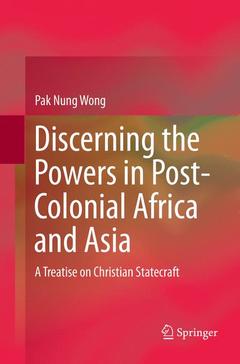Discerning the Powers in Post-Colonial Africa and Asia, 1st ed. 2016 A Treatise on Christian Statecraft
Auteur : Wong Pak Nung

Qualifying post-Westphalian sovereign statehood as a ?power? as argued for in Hendrik Berkhoff?s political theology, this book addresses the decades-long theological-spiritual debate between Christian realism and Christian pacifism in U.S. foreign policy and global Christian circles. It approaches the debate by delving into the pacifist Anabaptist political theology and delineates empirically how sovereign statehood in post-colonial Africa and Asia has fallen into the hands of the devil Satan, as a ?fallen power? in the Foucaultian terms of power structures, techniques and episteme. While the book offers intervention schemes and options, it holds that Christian statecraft remains the source of hope to effectively address a number of serious global issues. By extension, the book is thus an invitation to ignite debates on the suitability of Christian statecraft and the nexus between spirituality and world politics, making it especially interesting for scholars and students in the fields of International Politics, Politics of Asian and African States, Post-colonial Studies and Political Theology.
Table of Contents.- List of Figures.- List of Tables.- Abbreviations of Bible Versions.- Chapter 1: Introduction: Toward a Christian Perspective of the Post-Colonial State in Africa and Asia.- Part I: Structures.- Chapter 2: Haunted Structures: Agents and Violent Conflicts in Post-Colonial African State Formation.- Chapter 3: Sovereign, Deja Vu! Unmasking the Resonating Structures in the Rwandan and Cambodian State-making Genocides.- Part II: Techniques.- Chapter 4: Techniques of Hegemony and Sovereignty: Censure, Exception and Criminal Justice in Colonial Hong Kong and Socialist China.- Chapter 5: Warlord Techniques in Post-Colonial Asia: Constitutive Agency, Patron–Client Network, and Robust Action.- Part III: Episteme and Interventions.- Chapter 6: Frontier Governmentality: The Art of Caring the Soul through the Eyes of a Christian Philippine ‘Strongman’.- Chapter 7: Redeeming Knowledge from Power: Exploring Academic Spirituality through a Buddhist-Christian Dialogue (with Suchitra Chongstitvatana of Chulalongkorn University, Thailand).- Chapter 8: Conclusion: Two Options of Post-Colonial Christian Statecraft.
Dr Pak Nung Wong is a Senior Lecturer at Department of Politics, Languages and International Studies (PoLIS) at the University of Bath, United Kingdom. He teaches politics and international relations in East and South East Asia. Apart from serving as the Editor-in-Chief of Bandung: Journal of the Global South (SpringerOpen), his research interests cover the sociological, geopolitical and theological-spiritual aspects of Christian statecraft in the post-colonial African and Asian contexts. Recent book is Post-Colonial Statecraft in South East Asia: Sovereignty, State Building and the Chinese in the Philippines (I. B. Tauris, 2013). As an ecumenical Christian, he was educated in Lutheran and Anglican Christian schools in Hong Kong and is a member of the Evangelical Lutheran Church (Hong Kong). He is also Research Academic at the Roman Catholic Archdiocese of Tuguegarao in the Philippines.
Date de parution : 12-2018
Ouvrage de 182 p.
15.5x23.5 cm
Date de parution : 02-2016
Ouvrage de 182 p.
15.5x23.5 cm
Thème de Discerning the Powers in Post-Colonial Africa and Asia :
Mots-clés :
Academic Spirituality and Buddhist-Christian Dialogue; Censure; Exception and Criminal Justice in Socialist China; Christian Pacifism; Christian Social Theory and Post-Colonial States; Christian Social Theory in Africa; Christian Social Theory in Asia; Christian Statecraft and the Cambodian Genocide; Christian Statecraft and the Rwandan Genocide; Christian pacifist political theology; Christian realism; Christian statecraft and Foucaultian perspectives; Christian statecraft and the Philippine ‘Strongman’; Christian statecraft in post-colonial Africa; Christian statecraft in post-colonial Asia; Hendrik Berkhoff’s political theology; Pacifist Anabaptist political theology; Post-Colonial Christian Statecraft; U.S; foreign policy



